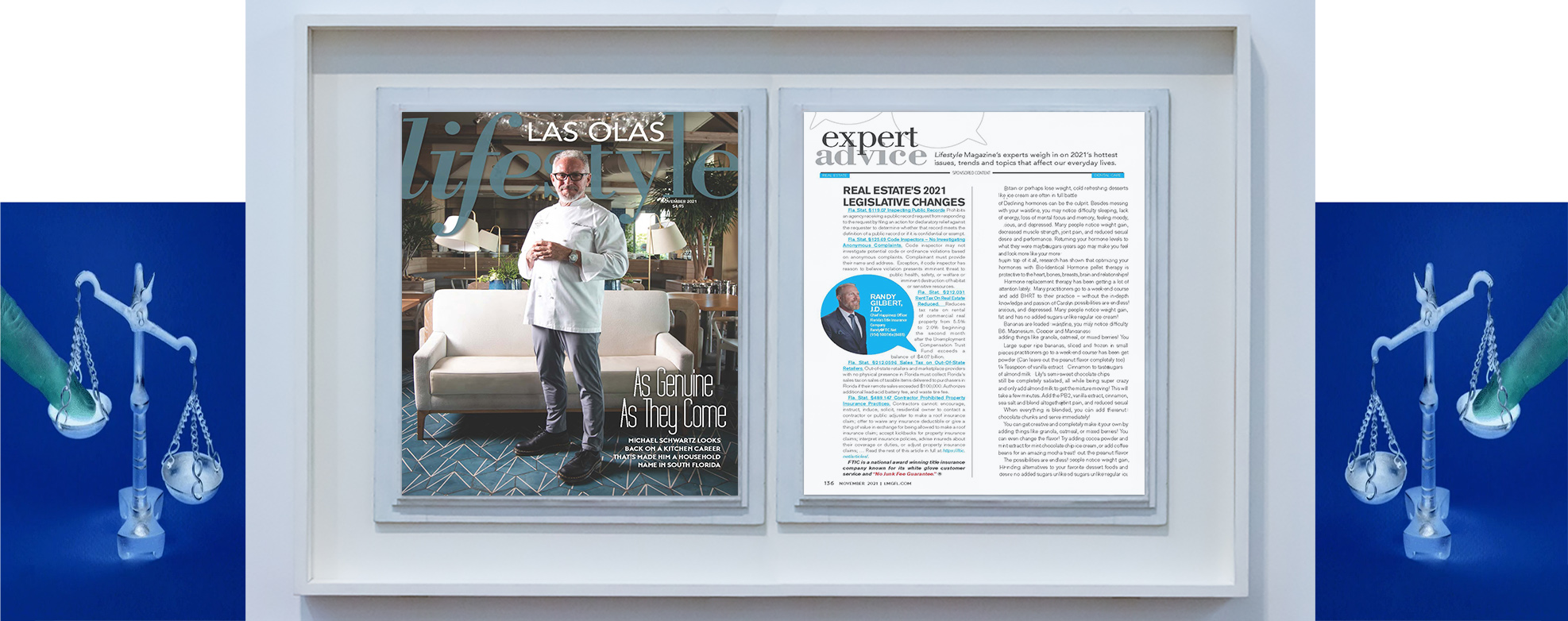Fla. Stat. §119.07 – Inspecting Public Records Prohibits an agency receiving a public record request from responding to the request by filing an action for declaratory relief against the requester to determine whether that record meets the definition of a public record or if it is confidential or exempt.
Fla. Stat. §125.69 – Code Inspectors – No Investigating Anonymous Complaints. Code inspector may not investigate potential code or ordinance violations based on anonymous complaints. Complainant must provide their name and address. Exception, if code inspector has reason to believe violation presents imminent threat to public health, safety, or welfare or imminent destruction of habitat or sensitive resources.
Fla. Stat. §212.031 – Rent Tax On Real Estate Reduced. Reduces tax rate on rental of commercial real property from 5.5% to 2.0% beginning the second month after the Unemployment Compensation Trust Fund exceeds a balance of $4.07 billion.
Fla. Stat. §212.0596 – Sales Tax on Out-Of-State Retailers. Out-of-state retailers and marketplace providers with no physical presence in Florida must collect Florida’s sales tax on sales of taxable items delivered to purchasers in Florida if their remote sales exceeded $100,000. Authorizes additional lead-acid battery fee, and waste tire fee.
Fla. Stat. §489.147 – Contractor Prohibited Property Insurance Practices. Contractors cannot: encourage, instruct, induce, solicit, residential owner to contact a contractor or public adjuster to make a roof insurance claim; offer to waive any insurance deductible or give a thing of value in exchange for being allowed to make a roof insurance claim; accept kickbacks for property insurance claims; interpret insurance policies, advise insureds about their coverage or duties, or adjust property insurance claims; provide insureds with contracts without a good faith estimate of the itemized and detailed cost of services and materials for repairs undertaken.
Fla. Stat. §501.059 – Private Cause Of Action for Telephone Solicitations. All sales telephone calls, text messages, direct-to-voicemail transmissions, recorded message, using an automated machine to dial must have recipients prior express written consent. Creates private cause of action for $500 or actual damages if more, which may be trebled (3x) by the court.
Fla. Stat. §501.616 – Telephone – Blocking Caller ID, Creating False Phone Number. No salesperson may prevent transmission of their name or telephone number, or use technology to display a different caller identification number.
Fla. Stat. §501.616 – Telephone Solicitations time frames and limitation on amount of calls. No salesperson may call or send a recorded message outside 8AM-8PM, nor more than three (3) times over 24 hours on the same subject matter.
Fla. Stat. §626.854(15) – Contractor Prohibition as Public Adjuster or Recommending Public Adjusters. Contractors and their subs may not advertise, solicit, offer to handle, handle, or perform public adjuster services unless licensed as a public adjuster. They can recommend a consumer contact their own insurance company.
Fla. Stat. §626.854(22) – Public Adjuster Prohibitions Relating To Roofs. Offering residential owner rebates, anything of value in exchange for being allowed to: (a) conduct a roof inspection; or (b) Make a roof insurance claim. Offering or accepting any compensation, inducement, or reward for the referral of roof insurance claims.
Fla. Stat. §715.12 – Construction Contract Prompt Payment Law. Increases late payment interest on construction contracts to the rate specified in §55.03, plus twelve percent (12.00%) per annum.
Fla. Stat. §718.111 Condo – $150.00 Transfer Fee. Increases fee condo may charge for transfer of a unit from $100.00 to $150.00.
Fla. Stat. §718.111 Condo – Renter Right To Inspect. Allows renters to inspect and copy Declaration of Condo, bylaws, and rules.
Fla. Stat. §718.113 Condo – Unit Owners Right to install Charging Stations. Permits unit owners with their own designated parking spot to install charging stations for electric or a natural gas fuel vehicle.
Fla. Stat. §718.121 – Condos, Form Of Notice, Prerequisites To Claiming Attorney Fees, Increasing Time To Pay Before Liening. Condos may send invoices and statements via email but only if condo unit owner affirmatively opts in. Unit owners are entitled to a “Notice of Late Assessment” (on a statutorily prescribed form) stating the amount owed to the Condo before attorney fees may be charged attorney fees. The “Notice of Late Assessment” must specify the amount owed and allow the owner to pay past due assessments without paying additional attorney fees. With regards to Condos sending a “NOTICE OF INTENT TO RECORD A CLAIM OF LIEN,” the period of time a unit owner has to pay a monetary obligation after receiving the Condo’s notice is increased from 30 days to 45 days (this now conforms to the 45-day payment period afforded parcel owners in HOAs).
Fla. Stat. §718.202 Condo Developer – Limitation On Use Of Buyer’s Escrowed Funds. Condo developer may spend escrowed funds on actual costs of construction and development; not marketing, loan, professional, or insurance costs.
Fla. Stat. §720.303 HOA – Guest List Confidentiality. Information an HOA obtains in a gated community in connection with guests’ visits are not accessible to members or owners.
Fla. Stat. §720.306 HOA – Restrictions On Rentals. HOA may amend HOA docs to prohibit or regulate rentals of 6 months or less. May prohibit more than 3 rentals per year. Inapplicability when 15 or fewer parcels.
Fla. Stat. §732.507 – Effect of Divorce on a Will. Provision in a will affecting a decedent’s spouse are void upon divorce. Exception, if the will is executed after the divorce, contrary intention in the will is specifically stated, or the divorce judgment provides otherwise.
Fla. Stat. §768.38 Liability Protections for COVID-19-related Claims. Makes claims against individuals, businesses, educational institutions, governments and religious institutions very difficult. Civil actions based on COVID-19 must meet the following requirements: (a) The complaint must be pled with particularity; (b) be accompanied by a Florida physician’s affidavit attesting that the plaintiff’s COVID-19 injuries occurred as a result of the defendant’s acts or omissions; (c) generally be commenced within 1 year after the cause of action accrued; (d) Court must then conduct a hearing to determine compliance with the foregoing or dismiss the action without prejudice; (e) Court must also determine whether the defendant made a good faith effort to substantially comply with authoritative or controlling government issued health standards. If the court determines defendant made a good faith effort, the defendant is immune from civil liability. If the court determines the defendant did not make such a good faith effort, the plaintiff may continue with their suit but must prove by clear and convincing evidence that the defendant acted with gross negligence. Different standard applies to health care providers.
Fla. Stat. §823.14 – Florida Right to Farm Act. Limits nuisance claims (e.g. noise, smoke, odors, dust, fumes, particle emissions, or vibration) against farm operations to real estate owners within ½ mile from where nuisance is emanating. Also limits damages which may be sought.
Fla. Stat. §934.50 – Prohibitions on drone videoing and exceptions. Without written consent, no person state agency, or a political subdivision may use a drone to record privately owned real property or of the owner, tenant, occupant, invitee, or licensee of such property with the intent to conduct surveillance in violation of such person’s reasonable expectation of privacy. Creates a private cause of action against violators including attorney fees, multipliers, punitive damages, and injunctive relief.
Law enforcement agencies (including code enforcement) may not use drones to gather evidence or other information. Exceptions include: (a) counter high risk of terrorist attack; (b) search warrant obtained authorizing use of drone; (c) swift action is needed to prevent imminent danger to life or serious damage to property; search for a missing person; prevent imminent: escape of a suspect or destruction of evidence; (d) aerial views of crowds of 50 people or more; (e) assist with traffic management but not to issue traffic citations; (f) collect evidence at a crime or traffic crash scene; (g) Assess flood, wildlife, natural disaster damage during state of emergency, vegetation or wildlife management on public land or water; (h) fire department personnel to perform tasks within their certification; (i) person engaged in a business or profession licensed by the state, or by an agent, employee, or contractor thereof, if the drone is used only to perform reasonable tasks within the scope of practice or activities permitted under such person’s license; (j) property appraisers for assessing ad valorem taxes; (k) for electric, water, or natural gas utilities; (l) aerial mapping; (m) deliver cargo; (n) capture images necessary to safely operate or navigate the drone; (o) communication service providers; (p) Fish and Wildlife to eradicate invasive exotic plants or animals on public lands, and suppressing wildfires.
DISCLAIMER: Topics discussed are general concepts, not intended to constitute legal advice, accuracy, nor completeness, and may not be relied upon as such; consult an attorney or accountant. The author Randy Gilbert, J.D. is neither an attorney nor an accountant. FTIC is a national award winning title insurance company known for its white glove customer service and “No Junk Fee Guarantee.” ®

